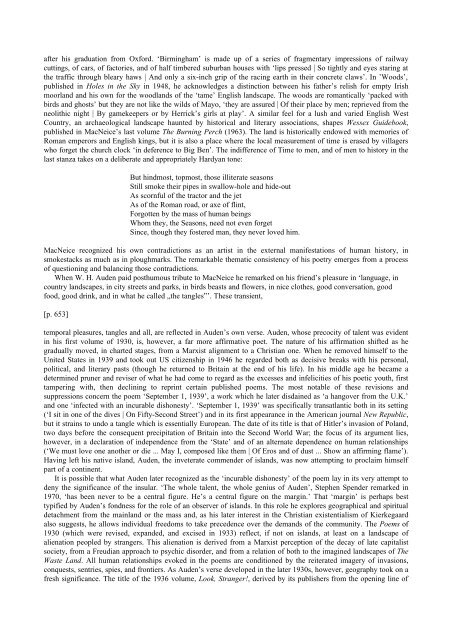THE SHORT OXFORD HISTORY OF ENGLISH LITERATURE
THE SHORT OXFORD HISTORY OF ENGLISH LITERATURE
THE SHORT OXFORD HISTORY OF ENGLISH LITERATURE
Create successful ePaper yourself
Turn your PDF publications into a flip-book with our unique Google optimized e-Paper software.
after his graduation from Oxford. ‘Birmingham’ is made up of a series of fragmentary impressions of railway<br />
cuttings, of cars, of factories, and of half timbered suburban houses with ‘lips pressed | So tightly and eyes staring at<br />
the traffic through bleary haws | And only a six-inch grip of the racing earth in their concrete claws’. In ’Woods’,<br />
published in Holes in the Sky in 1948, he acknowledges a distinction between his father’s relish for empty Irish<br />
moorland and his own for the woodlands of the ‘tame’ English landscape. The woods are romantically ‘packed with<br />
birds and ghosts’ but they are not like the wilds of Mayo, ‘they are assured | Of their place by men; reprieved from the<br />
neolithic night | By gamekeepers or by Herrick’s girls at play’. A similar feel for a lush and varied English West<br />
Country, an archaeological landscape haunted by historical and literary associations, shapes Wessex Guidebook,<br />
published in MacNeice’s last volume The Burning Perch (1963). The land is historically endowed with memories of<br />
Roman emperors and English kings, but it is also a place where the local measurement of time is erased by villagers<br />
who forget the church clock ‘in deference to Big Ben’. The indifference of Time to men, and of men to history in the<br />
last stanza takes on a deliberate and appropriately Hardyan tone:<br />
But hindmost, topmost, those illiterate seasons<br />
Still smoke their pipes in swallow-hole and hide-out<br />
As scornful of the tractor and the jet<br />
As of the Roman road, or axe of flint,<br />
Forgotten by the mass of human beings<br />
Whom they, the Seasons, need not even forget<br />
Since, though they fostered man, they never loved him.<br />
MacNeice recognized his own contradictions as an artist in the external manifestations of human history, in<br />
smokestacks as much as in ploughmarks. The remarkable thematic consistency of his poetry emerges from a process<br />
of questioning and balancing those contradictions.<br />
When W. H. Auden paid posthumous tribute to MacNeice he remarked on his friend’s pleasure in ‘language, in<br />
country landscapes, in city streets and parks, in birds beasts and flowers, in nice clothes, good conversation, good<br />
food, good drink, and in what he called „the tangles”’. These transient,<br />
[p. 653]<br />
temporal pleasures, tangles and all, are reflected in Auden’s own verse. Auden, whose precocity of talent was evident<br />
in his first volume of 1930, is, however, a far more affirmative poet. The nature of his affirmation shifted as he<br />
gradually moved, in charted stages, from a Marxist alignment to a Christian one. When he removed himself to the<br />
United States in 1939 and took out US citizenship in 1946 he regarded both as decisive breaks with his personal,<br />
political, and literary pasts (though he returned to Britain at the end of his life). In his middle age he became a<br />
determined pruner and reviser of what he had come to regard as the excesses and infelicities of his poetic youth, first<br />
tampering with, then declining to reprint certain published poems. The most notable of these revisions and<br />
suppressions concern the poem ‘September 1, 1939’, a work which he later disdained as ‘a hangover from the U.K.’<br />
and one ‘infected with an incurable dishonesty’. ‘September 1, 1939’ was specifically transatlantic both in its setting<br />
(‘I sit in one of the dives | On Fifty-Second Street’) and in its first appearance in the American journal New Republic,<br />
but it strains to undo a tangle which is essentially European. The date of its title is that of Hitler’s invasion of Poland,<br />
two days before the consequent precipitation of Britain into the Second World War; the focus of its argument lies,<br />
however, in a declaration of independence from the ‘State’ and of an alternate dependence on human relationships<br />
(‘We must love one another or die ... May I, composed like them | Of Eros and of dust ... Show an affirming flame’).<br />
Having left his native island, Auden, the inveterate commender of islands, was now attempting to proclaim himself<br />
part of a continent.<br />
It is possible that what Auden later recognized as the ‘incurable dishonesty’ of the poem lay in its very attempt to<br />
deny the significance of the insular. ‘The whole talent, the whole genius of Auden’, Stephen Spender remarked in<br />
1970, ‘has been never to be a central figure. He’s a central figure on the margin.’ That ‘margin’ is perhaps best<br />
typified by Auden’s fondness for the role of an observer of islands. In this role he explores geographical and spiritual<br />
detachment from the mainland or the mass and, as his later interest in the Christian existentialism of Kierkegaard<br />
also suggests, he allows individual freedoms to take precedence over the demands of the community. The Poems of<br />
1930 (which were revised, expanded, and excised in 1933) reflect, if not on islands, at least on a landscape of<br />
alienation peopled by strangers. This alienation is derived from a Marxist perception of the decay of late capitalist<br />
society, from a Freudian approach to psychic disorder, and from a relation of both to the imagined landscapes of The<br />
Waste Land. All human relationships evoked in the poems are conditioned by the reiterated imagery of invasions,<br />
conquests, sentries, spies, and frontiers. As Auden’s verse developed in the later 1930s, however, geography took on a<br />
fresh significance. The title of the 1936 volume, Look, Stranger!, derived by its publishers from the opening line of









